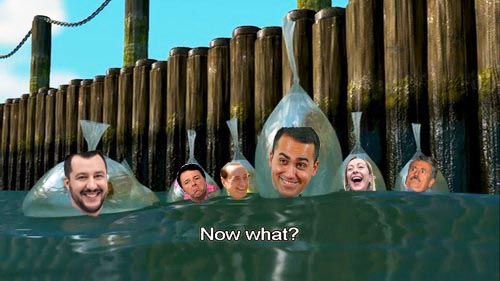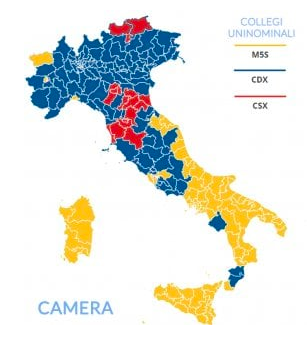Italy’s election results
We won! What did we win?

Fear and loathing in Brussels. On March the 4th, the Italian people voted to elect their new representative for the national parliament. The clear winners of this electoral turn are the anti-establishment Five Star Movement (first party) and The League (first party in the coalition that got the most votes). Even if this result was somewhat expected, the scale of the collapse of Renzi’s Democratic Party as well as the unexpected overtake of Matteo Salvini’s League over Silvio Berlusconi’s Forza Italia, has made for an interesting scenario.
What will happen now? Who will be in charge of the country? Nobody knows. Renzi is set to step down as head of the party, but has, in the meanwhile, made it clear that they should stay clear of any coalition government, given the fact that he thinks the other two sides have made unrealistic promises and have also unfairly targeted him and his government for years, safely criticizing from the opposition stands. What about the winners?

As we can see from the map, even though the League (formerly known as the Northern League) has abandoned his regionalism in favour of a more national agenda, the country is almost perfectly split along its north/south axis, with just a few regions in the centre-north (which are historical strongholds of the left) to the Democratic Party coalition. The rich and industrious have been convinced by the centre-right plan to slash taxes while the impoverished and more rural south seemed to have favoured the Five Star plan for some sort of universal basic income. Both sides though hammered on what has been perceived as the weaknesses of PD: security, immigration control, unemployment and the inability to make Italian interests heard in Brussels. While the first three themes are common shortcomings to every current left-wing party in Europe, Euroscepticism is something more peculiar to the Italian situation and is, additionally, a recent phenomenon given Italy’s historical favourable position towards the European Union.
Brussels itself remains cautious and has expressed full support to President Sergio Mattarella, but deep down it knows the stakes are high and that a crisis in Italy could very well spell the end of the European project as a whole. For the moment though, the wait game is on as neither of the three sides has enough votes to get a government. If the Democratic Party refuses to enter into a coalition, what remains is an unlikely alliance between the Five Star Movement (which has in the past always shunned coalitions) and either the Northern League alone or the whole centre-right coalition. This seems unlikely for several reasons. First of all, this would mean an alliance between the Five Stars and Berlusconi’s party, which would not sit well with its anti-establishment base. Secondly, even if the League went alone in this coalition, it could be unclear why would it leave a position of power now (being the biggest party on the centre-right) to go play the role of the junior partner in a Five Star government. Furthermore both would suffer from opposition fatigue, as they would have to enact a wild and very expensive array of promises while basically hearing at every wrong turn an “I told you so” coming from the seats of the Democratic Party.
So, impasse? Yes, it seems we are destined for a staring contest in the near future. Many analysts and opinion leaders are blaming the electoral law (which is mostly a proportional system), which does not guarantee a clear victor. This is somewhat unfair though, as this system (as evidenced all over Europe) were build for a more traditional bi-polar system, while now in Italy and in many other countries, the left/right split does not cut it anymore.
Having Italy moved to a tri-polar system, it would be hard for any system to provide a stable government and, on top of that, if the current austerity measures (or responsible spending as they call it in the north) continue, the mood of the country will remain frustrated and angry, which does not bode well for the EU. Why should they care in Brussels? Well, as I said at the beginning, even if many of the problems plaguing the peninsula are endemic and well known for decades, it is undeniable that being part of the Union implies a limited room for maneuver in a country which has to tackle this sort of imbalances. At the same time, Brussels has gained at least part of the accountability from national governments. If the EU wants to survive and move forward, it should demonstrate that it is able to carry everyone into the future, together. One mistake I believe Renzi’s government (and the EU as a whole) did was to highlight too much the economic successes while disregarding the obvious social strain that the Italian society is going through right now which. If the now famous “loser” of globalization, if the one left behind feel like there is no future for them ahead, why on earth would they follow?
In any case, it’s possible that there will be new elections soon. But the result is unlikely to change. Even assuming a Eurosceptic government will be formed, even without exiting the union or the Euro, it would greatly complicate matters in Brussels, especially in a time of much-needed reforms. Losing Italy or having it drag its feet and block any possible future integration, would probably grind everything to a halt and make it worse for everybody else as well. In the end, will this be a wake-up call or will we hit the snooze button, waking up late for work again?
